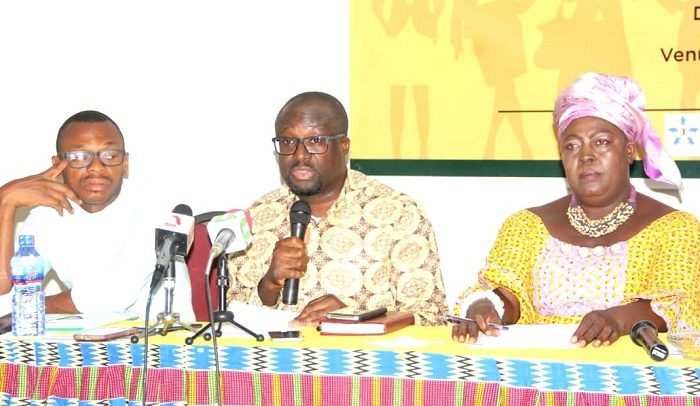Emmanuel Sin-Nyet Asigri (middle) and other dignitaries at the meeting
The National Youth Authority (NYA) has engaged stakeholders in a consultative meeting for their inputs towards the review of the 2010 National Youth Policy.
The meeting gave participants the opportunity to make their inputs into the policy in order to reflect the demands of contemporary times. Most of the participants were members of women groups.
According to the CEO of the National Youth Authority, Emmanuel Sin-Nyet Asigri, the need for a policy to guide the process to realize positive outcomes in youth development in the country necessitated the 2010 National Youth Policy.
He said based on the provisions of the 2010 policy, the government had engaged the youth and other stakeholders in meaningful partnership to develop appropriate interventions and services for youth empowerment and development.
However, Mr. Asigri bemoaned the 2010 policy in its current form saying it is not fit for purpose. He added that there was therefore the need to align the existing policy with government’s developmental agenda as well as other relevant international development protocols and frameworks such as the United Nations Sustainable Development Goals (SDGs) and Agenda 2063 of the African Union.
He indicated that the data in the existing policy was based on the 2000 population and housing census by the Ghana statistical service and that there was the need to capture recent date using the 2010 population and housing census to reflect current trends.
“Considering the dynamic nature of society, particularly issues related to the youth, there is the need for a review in order to respond to the challenging needs and emerging issues affecting youth development such as gender and youth with disabilities,” he said, adding that “these are not covered by the existing policy; thus, the need for disability mainstreaming in the revised Youth Policy”.
Touching on the progress of the review process so far, Mr. Asigiri disclosed: “Preliminary stakeholders’ engagements have been carried out, a National Technical Committee had been established, a concept paper to the review developed, retreats organized to evaluate the existing youth policy to identify gaps and to generate a gap analysis report has been completed and widely disseminated to inform and elicit inputs”.
“When the review of the current policy is complete and implementation plan developed, we can have a sigh of relief and be sure that we now have a workable, promising and innovative policy document that provides the youth-led and youth-centered solutions to current and future challenges” he reiterated.
By Abigail Owiredu-Boateng


